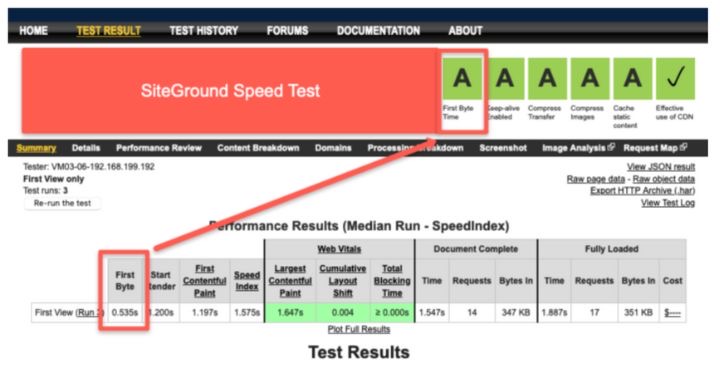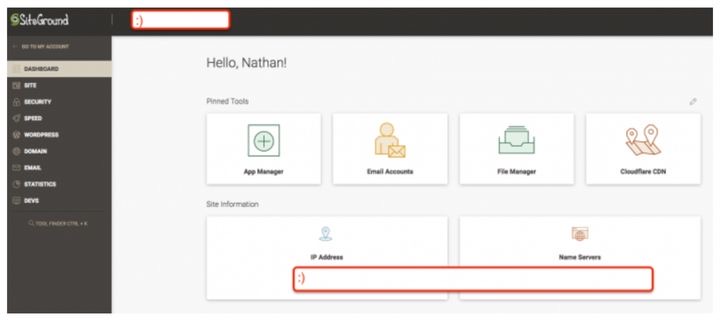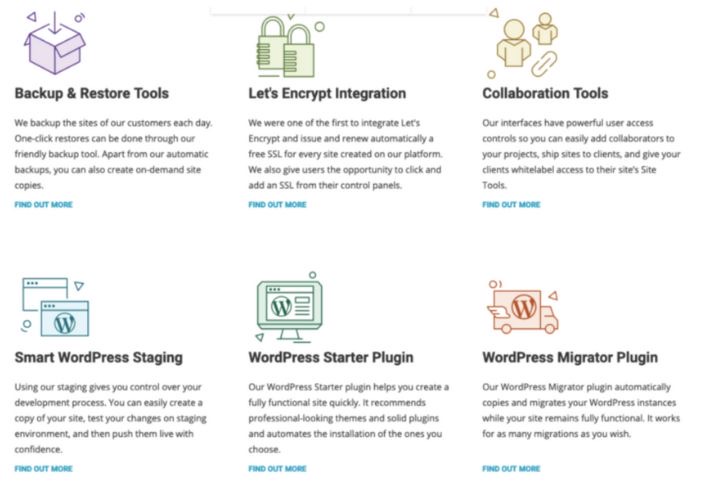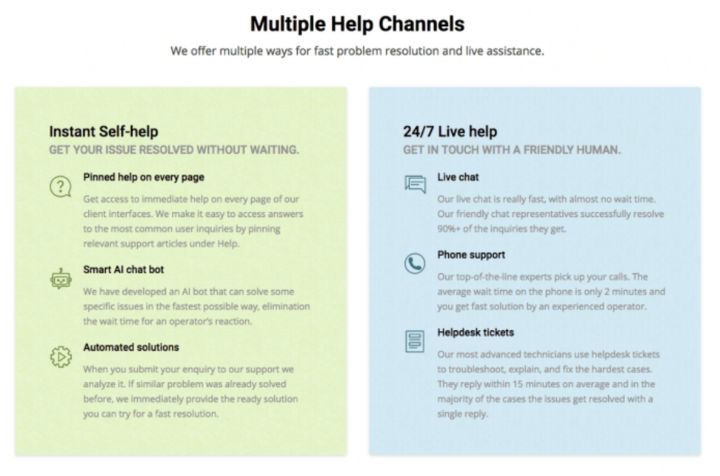SiteGround Review
| Support | Help Desk & Knowledge Base |
|---|---|
| Uptime | Good (99.97% past 6 months) |
| Guarantees | Uptime & 30-Day |
| Free Migration | |
| Best For | Developers, designers & agencies |
| Strengths | Great performance & advanced customer service |
| Weaknesses | Setup is not beginner-friendly |
| Promotion | Save Up To 80% |
What Is SiteGround?
SiteGround is an independent web hosting company offering a wide range of hosting solutions, including shared Linux hosting, managed WordPress hosting, WooCommerce support, and Cloud and Reseller hosting. The Bulgaria-based company was founded in 2004 and serves a global client base.
In this SiteGround review, I’ll cover the pros and cons, pricing and plans, and share my experience as a customer.
Is SiteGround Legit?
SiteGround is a legitimate web hosting business. They are one of the fastest-growing independent (i.e., not owned by a larger corporate holding company) hosting companies and provide domain hosting to more than 2,000,000 websites, employing more than 500 people worldwide. SiteGround is also a recommended web host by the WordPress Foundation.
What Is SiteGround Hosting Used For?
SiteGround is often used for hosting WordPress websites. They have a proprietary server backend and a cloud infrastructure that can host any website or web application, but most of their clients run WordPress. Their client base ranges from beginner bloggers to enterprise-level customers.
Like my experiment with Web Hosting Hub, I recently had a couple of small sites that needed their own hosting accounts, so I wanted to give SiteGround Hosting a try based on high praise from people I respect in the industry. I started that project several years ago and have kept the account active.
SiteGround Pricing
SiteGround offers the following web hosting plans:
| Plan | StartUp | GrowBig | GoGeek |
|---|---|---|---|
| Initial Price* | $2.99/mo. | $4.99/mo. | $7.99/mo. |
| Renewal Price | $14.99/mo. | $24.99/mo. | $39.99/mo. |
| Websites | 1 | unlimited | unlimited |
| Storage | 10 GB | 20 GB | 40 GB |
| Visitors/month | 10,000 | 100,000 | 400,000 |
| Free Domain Name | |||
| Free SSL | |||
| CDN | |||
| Dedicated IP | |||
| Daily Backups |

The web hosting plan features are identical to their WordPress / WooCommerce counterparts, except that WordPress is not auto-installed.
Industry-wide, there is rarely a difference between web hosting and WordPress hosting plans. The same goes for SiteGround. Their Web Hosting product is still optimized for WordPress…it’s just that WordPress is not auto-installed.
StartUp
StartUp, SiteGround’s entry-level plan, has a one-website limit and lacks premium features such as staging and on-demand backups. It’s ideal for beginners or anyone wanting to operate a small, single website.
GrowBig
SiteGrounds mid-tier plan, GrowBig, unlocks unlimited websites, offers on-demand backups, and adds staging functionality with one click. Staging allows you to create a copy of your website you can work on in the background without compromising your live site. You can instantly activate the changes from your staging site when you’re ready to implement it.
GoGeek
GoGeek puts your website on a server with fewer other websites, so you don’t have to share as many server resources. You also get Git and client management/site tools in your SiteGround account. This is ideal for agency owners.
WordPress Hosting Plans
SiteGround’s WordPress Hosting is exactly the same as their Web Hosting plans, except that WordPress is auto-installed. They are a WordPress host first across all their plans.
SiteGround is one of only three WordPress hosting providers (Bluehost and DreamHost are the other two) recommended by the WordPress.org organization.
WooCommerce Hosting Plan
SiteGround’s WooCommerce Hosting is exactly the same as their Web Hosting product, except that WordPress and the WooCommerce plugin are auto-installed.
Cloud Hosting Plan
SiteGround offers a scalable web hosting service in the cloud. In simple terms, cloud hosting allows you to pay per server use rather than for a server allocation.
SiteGround uses Google Cloud for its cloud hosting plan. You use SiteGround’s backend and get their support, but your website lives on Google’s servers (the same ones that run Google.com and YouTube.com).
With this product, SiteGround competes directly with other cloud resellers like Cloudways and Kinsta. The service is highly competitive price-wise, so the choice mainly comes down to backend tools and advanced support options.
Reseller Hosting Plan
SiteGround offers a suite of Reseller Hosting plans that are structured similarly to their web hosting product. I’ve explained Reseller Hosting here, but it’s a way for anyone to sell hosting under their own brand but with SiteGround’s backend.
SiteGround competes well with other reseller plans, though every hosting reseller will have to balance support, performance, and profit margins. SiteGround operates at a higher price point, which can limit reseller margins, but also alleviate support needs.
Enterprise Hosting Plan
SiteGround also offers custom Enterprise Hosting packages for $2000 and up. With Enterprise hosting, SiteGround can customize resources and technologies to fit any website or timeframe, including dedicated hosting.
SiteGround Alternatives
Pros of SiteGround
It’s easy to find reviews for SiteGround as there are hundreds online, with many based on anecdotes and personal experience. I don’t mind reading reviews; you’re reading mine right now, but I like to dig deeper when researching a new web host.
As I mention in all my web hosting reviews, there is no such thing as a “best” web host. It’s all about the right fit for your project based on your goals, budget, experience & expertise. With that in mind, here are the reasons I think you should consider SiteGround.
Speed & Performance
When someone types in your website’s address, that request gets sent to your web hosting server for the files. While many variables can affect website speed, it’s primarily your hosting server’s job to send the requested files to the visitor’s browser as quickly and as efficiently as possible.
SiteGround makes plenty of promises about website speed throughout their site. And from all the tests I’ve run since starting my account, they’ve lived up to the promise.
One of the main site speed factors is Time To First Byte (TTFB) – i.e., how quickly the server sends the first byte of the first file in response to a request. Here’s how my SiteGround website fared.

In addition to quick server performance, SiteGround has major data centers around the globe:
- Chicago
- London
- Amsterdam
- Singapore
They use Google’s Cloud infrastructure for cloud and enterprise plans. This matters because the physical distance your website files travel can impact website performance. Too many major web hosting brands assign customers to their one data center – often somewhere in the middle of the US.
That works if most of your customers are in North America. However, if your audience is focused elsewhere, you want your website files close to where they are, regardless of where you are.
For example, if you are an Australian ex-pat building a site for the Australian/Asian market – you’ll want your website to live in Australia or Singapore, not Utah. That factor in speed is a huge plus for SiteGround.

Lastly, SiteGround does a solid job of allocating resources. By definition, a shared hosting server is sharing resources among several customers. So it’s critical to get the allocation right. Many hosting companies will set very low memory limits on sites to keep a throttle on performance. I can see from my installs that SiteGround allows generous allocations with up-to-date software.
Even when I started my project, they had very high default limits.

They were one of the first hosting companies to make PHP 7 standard, and they continue to roll out cutting-edge speed features for all accounts.
SiteGround’s performance, speed, and reliability are major pros for their product.
Hosting Feature Set & Integrations
SiteGround has a strong feature set – especially if you are technically biased. They have unlimited databases and email accounts.
They perform daily backups, which is a good safety feature when your own backups fail. SiteGround uses a custom dashboard to make access to all your files & tools simple & straightforward.

GrowBig / GoGeek websites offer a free website transfer and a free WordPress site builder. None of these features stand out, but they place them above many well-known hosting brands.
SiteGround has many unique developer-oriented features, though. They integrate well with CloudFlare’s CDN. At the GoGeek level, they do free PCI compliance and free Git & staging areas, which are very useful.
The tradeoff with some of these features is that they have their own custom server backend. They do not use the industry-standard and more familiar cPanel software. Things might be a bit confusing if you are coming from another host. But their setup is a value-add for customers with higher-traffic websites.
Overall, SiteGround’s WordPress staging feature on the GoGeek plan is helpful for high-traffic websites. Setting up staging servers where you can edit a non-live version of your site and the “push” it live can be a pain to set up – even if they are best practices. Doing “hot fixes” on a live site is simple but not ideal.
I like how SiteGround promotes the most popular content management systems like WordPress. They don’t upsell any fake “WordPress-specific” features – they show how their built-in features drive better performance for WordPress and (to a lesser degree) Joomla.
SiteGround has always included the latest, greatest product integrations.

They have a free SSL certificate that rolls out at a click of a button. This removes a big obstacle to SSL with WordPress. They also have direct integrations with CDNs like Cloudflare CDN. They’re rolling out investments in NGINX, HTTP/2, PHP 7, built-in CDN and Caching, and more. They have incredible uptime and bandwidth allocations. They also have lots of customization built around WordPress websites.
Lastly, SiteGround offers a full spectrum of hosting solutions. If you have a rapidly growing site, you can grow it with them from StartUp to an Enterprise Dedicated Server.
Advanced Customer Support
Generally, my experience with SiteGround Customer Support has been okay.
But over the past year, I’ve noticed a pattern in my inbox. SiteGround’s “front-end” customer service seems to have worsened, while stories of successful large site migrations have stayed the same.
Usually, I like to look at “proxies” for customer support. In other words, things indicate something about the culture & processes of customer support.
SiteGround does especially well with a few of these proxies. First, they are transparent and responsive across phone and live chat channels.

Also, it’s apparent that they invest in their employees because their employees put on technical events to train developers.
Those factors, plus their endorsement from high-profile WordPress core contributors, put SiteGround’s advanced customer service in the pro column for me.
However, I can’t avoid the uptick in poor experience stories I’ve received in the past six months, which I address in my SiteGround cons list below.
Global Oriented Hosting
The last major pro of SiteGround is its global orientation. They’re from Bulgaria, a small but rapidly growing tech hub in Eastern Europe. Bulgaria has no vast internal market, so it must be globally oriented to get a solid market.
SiteGround must be twice as good to compete in the global web hosting industry. From their website copy and interface design, it looks like they go above and beyond to create a global look and feel that works for anyone – not just an American small business person.
They accept multiple currencies (AUD, USD, GBP, EUR) and offer multiple local toll-free lines + free country-specific domains. The hosting industry is typically very US-centric, so this change is welcomed.
I like how they have a dedicated Spanish-language site. Their distributed data center locations are a big advantage for businesses building an international audience, especially in Europe and Asia.
Cons of SiteGround
Like any web host, SiteGround has disadvantages. Here are the cons I noted while using SiteGround.
Renewal Pricing Point
SiteGround’s introductory pricing, which they offer new customers for the first year, is competitive. However, their standard renewal pricing is expensive compared to the industry, especially for their StartUp plan. Here’s what you’ll pay for each plan at renewal:
- StartUp – $14.99 per month
- GrowBig – $24.99 per month
- GoGeek – $39.99 per month
All plans have disk space limits, and StartUp limits you to a single domain.
With SiteGround, you are paying for quality. So I want to emphasize that this con isn’t a knock on SiteGround’s value, just the price point. They are more expensive than other high-performing, independent hosting companies like:
If pricing is a major factor for you, you can get much cheaper discounting, solid features, and pretty good support with a big brand shared host like:
If getting the lowest price is your primary objective, then SiteGround is probably not your best option. When considering the features SiteGround offers, the higher pricing makes sense. To help you compare SiteGround with other web hosting companies, check out my posts on the best web hosting and best WordPress hosting companies.
Frontline Customer Support Trends
As mentioned, I’ve been getting several emails and have seen many reports on Reddit & Twitter that SiteGround’s frontline customer support has been deteriorating.
They still claim a 90% closure rate and low wait times, but I get the sense they are having a hard time fulfilling complex requests from beginner and intermediate customers.
The extent of this is difficult to measure, but I’ve made my clients aware of it and thought it was worth mentioning here.
Developer & Agency Focus
Every web hosting provider has an initial target market and then tries to expand out to complementary markets (ie, they start with small businesses and expand out to agencies or medium businesses). SiteGround seems to position itself towards the professional developer market, i.e., developers building websites for businesses.
That’s not a bad thing in itself – it’s a good thing if you’re a developer – but it does make it more difficult to appeal to a more general audience. While most of SiteGround’s platform is simple and straightforward, many of their features lack appeal for a general audience, especially compared to other hosts like:
For example, SiteGround does not use cPanel – they use a custom dashboard with a strong tilt towards developers using SSH over DIYers using File Manager.
Their top-tier plan sells a WordPress / Joomla staging area and Git integration. Those are incredible features. But the average person creating a website will not use those. Not even small developers or agencies use those for many clients.
SiteGround doesn’t offer the range of marketing bonuses other web hosts include, like Google Ads credits, Facebook ad credits, free premium WordPress themes, free iStockphoto credits, etc. I used to think those were universal, but they’re not at SiteGround.
Overall, SiteGround’s appeal to developers is great. If you don’t need the advanced features (mainly in the GoGeek Plan), you don’t have to use them – but they’ll be there when you want them.
SiteGround Startup is simple and straightforward. Again, it’s about what features you are looking for – and what features you will use.
Is SiteGround Worth It?
So – is SiteGround good or worth it?
Well, there’s a reason SiteGround is one of the largest and fastest-growing independent web hosting companies. They have a solid product and great support. Being headquartered in Bulgaria makes them much more globally oriented than many US companies while offering a truly world-class product.
If you are looking for a hosting company with an international bent, a focus on solid technical features, and a full path of plans for a website that will grow, you can get a deep discount on SiteGround’s plans.
If you are looking for a hosting provider with all the benefits of SiteGround – but slightly better pricing and guarantees, I’d go with InMotion Hosting.
For other options, check out my best WordPress host and best web host articles.








